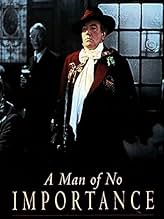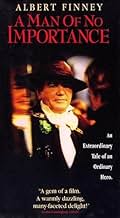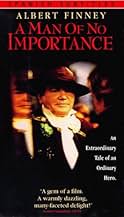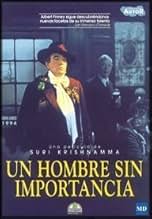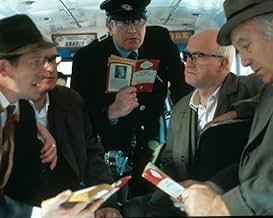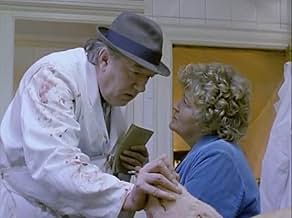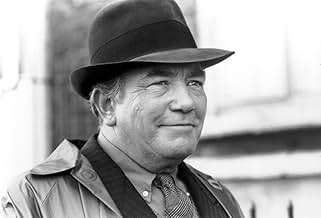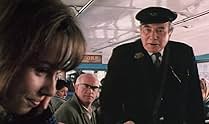IMDb RATING
6.7/10
1.3K
YOUR RATING
A friendly, poetry quoting bus conductor in 1963 Dublin wants to stage Oscar Wilde's play, Salome, with passengers on his bus.A friendly, poetry quoting bus conductor in 1963 Dublin wants to stage Oscar Wilde's play, Salome, with passengers on his bus.A friendly, poetry quoting bus conductor in 1963 Dublin wants to stage Oscar Wilde's play, Salome, with passengers on his bus.
- Director
- Writer
- All cast & crew
- Production, box office & more at IMDbPro
Featured reviews
In once sense this comment is a response to some of the comments/reviews already posted here. Some reviewers were apparently looking for a message or statement from the film and felt disappointed. At times, I think the "message" can be secondary to the art of the actor or the filmmaker. Ironically, the main character in "A Man of No Importance" is passionate about "Art for Art's sake". Art doesn't have to have a point. Part of the art of this film is in the tapestry of colorful characters, wonderful dialog, and captivating performances. Albert Finney, Brenda Fricker, Michael Gambon, as one would expect from actors of their calibers, are completely convincing and real. Albert Finney's performance is perfectly calibrated, his character a combination of charming exuberance and subtly expressed confusion and loneliness.
It may be the director intended to put across a particular message about homosexuality, but to me it seems the real message and point to the film is the resilience of the human spirit throughout the experiences of isolation, loneliness, frustration, confusion, sadness, repression, etc. Attitudes about homosexuality in 1960s Dublin is one context in which to express this, but obviously it's a universal theme that can be played out in many settings.
The real challenge, and where this movie succeeds in spades, is in bringing humor, lightness, and real poignancy to the issue through a character one can genuinely like and relate to on so many levels. The credit for this is attributable to Albert Finney's brilliant acting in a film that is ultimately about the frailty and the endurance of one man, who could be any man.
One aside: the reviewer who liked the film but made the comment that it's unusual for Albert Finney to play a real person, must have not seen many of his films. Admittedly, he has often portrayed characters who are "bigger than life", but he can also quite effectively play ordinary people. I recommend the reviewer check out the following films: Saturday Night and Sunday Morning, Two for the Road, Charlie Bubbles, The Browning Version, Shoot the Moon, Rich in Love, The Playboys, Erin Brockovich, Gumshoe, The Run of the Country, Endless Game, Picasso Summer, and The Image.
It may be the director intended to put across a particular message about homosexuality, but to me it seems the real message and point to the film is the resilience of the human spirit throughout the experiences of isolation, loneliness, frustration, confusion, sadness, repression, etc. Attitudes about homosexuality in 1960s Dublin is one context in which to express this, but obviously it's a universal theme that can be played out in many settings.
The real challenge, and where this movie succeeds in spades, is in bringing humor, lightness, and real poignancy to the issue through a character one can genuinely like and relate to on so many levels. The credit for this is attributable to Albert Finney's brilliant acting in a film that is ultimately about the frailty and the endurance of one man, who could be any man.
One aside: the reviewer who liked the film but made the comment that it's unusual for Albert Finney to play a real person, must have not seen many of his films. Admittedly, he has often portrayed characters who are "bigger than life", but he can also quite effectively play ordinary people. I recommend the reviewer check out the following films: Saturday Night and Sunday Morning, Two for the Road, Charlie Bubbles, The Browning Version, Shoot the Moon, Rich in Love, The Playboys, Erin Brockovich, Gumshoe, The Run of the Country, Endless Game, Picasso Summer, and The Image.
A slight film of forbidden love in early sixties Dublin. There is some great period detail and some lovely funny and touching and dark scenes, but the film IS Albert Finney - a momentous performance as a gay man desperate to consummate his passion for a man he knows he cannot have, and desperate also to create beautiful things in a grey, humdrum world which just doesn't understand him. Finney is absolutely fantastic.
Normally I do not like Albert Finney. In fact I think he's one of the most overrated actors in film (I suspect his style of acting works much better on stage). This movie was an exception. For once he played a real person, and, except for one or two scenes, managed to quench his desire to gnaw at the scenery. I found myself totally identifying with the lead character for once. All of the acting is very effective, and the story is believable. A rare thing in movies. This would be a good double bill for 'My Beautiful Laundrette'. Odd that Indian's present homosexuality believably in English films, but I have never scene an Indian film even portray homosexuality (and, yes, I have seen many Indian films).
Starring Albert Finney as a deeply closeted gay man who is a bus conductor in 1960s Dublin as he endeavours direct a production of Oscar Wilde's play "Salome".
It boasts a great supporting cast of Brenda Fricker, Michael Gambon, Rufus Sewell, Tara Fitzgerald and Patrick Malahide.
It boasts a great supporting cast of Brenda Fricker, Michael Gambon, Rufus Sewell, Tara Fitzgerald and Patrick Malahide.
In 1963's Dublin Alfred Byrne is a bus conductor who pleasures his working class passengers with poetry recitals as he punches their tickets. Head of a local theatre group, Byrne is inspired by meeting new passenger Adele Rice to drop his plans to do Importance of Being Earnest and instead go up with Salome. With the challenges to the material from those who would usually support him, Byrne also faces much more negative attention than he would usually like as various truths and secrets come out.
Although the plot does have some interesting aspects to it, it is hard to ignore how average a fist it makes of this story. The threads are there to be delivered and at its heart is Byrne, who is a complex character and one that could have been more interesting. Sadly Krishnamma cannot seem to bring this out of the script with any degree of sharpness. Although I get the idea of the mood and tone that the director was going for, the effect it has is to slow the film right down to the point where it crawls and is surprisingly unengaging. Visually the film has a nice feel of the period but the drab looks again tend to drag the film down a bit.
On paper the cast suggests that they can lift the material themselves but surprisingly nobody does and many of them deserved better. Finney's accent is pretty awful (which didn't help anything) and although he has a certain dignity befitting the character, and brings out some pain, he is never as convincing as he should have been. Fricker, Gambon, Sewell and Fitzgerald are mostly OK but they are given little to do in this film.
A fairly uninspiring affair then. There are things of interest in here but they aren't delivered that well and the film is surprisingly dull.
Although the plot does have some interesting aspects to it, it is hard to ignore how average a fist it makes of this story. The threads are there to be delivered and at its heart is Byrne, who is a complex character and one that could have been more interesting. Sadly Krishnamma cannot seem to bring this out of the script with any degree of sharpness. Although I get the idea of the mood and tone that the director was going for, the effect it has is to slow the film right down to the point where it crawls and is surprisingly unengaging. Visually the film has a nice feel of the period but the drab looks again tend to drag the film down a bit.
On paper the cast suggests that they can lift the material themselves but surprisingly nobody does and many of them deserved better. Finney's accent is pretty awful (which didn't help anything) and although he has a certain dignity befitting the character, and brings out some pain, he is never as convincing as he should have been. Fricker, Gambon, Sewell and Fitzgerald are mostly OK but they are given little to do in this film.
A fairly uninspiring affair then. There are things of interest in here but they aren't delivered that well and the film is surprisingly dull.
Did you know
- TriviaThe bus depot filming location was the Broadstone Dublin Bus Depot, in Dublin 7, Ireland. Formerly, the Broadstone Railway Terminus, prior to the de-commissioning of the Great Western Railway line, and it being used as a bus depot, in the mid 2010s, the forecourt was completely demolished to accommodate the Luas Cross City tram stop and route passing what later became the new consolidated DIT Grangegorman University campus. By coincidence, the former "mental hospital" land adjacent to Broadstone Depot, that later became the DIT Student Accommodation site, was used as a backlot to build the (geographically inaccurate) O'Connell Street/GPO exterior set for Neil Jordan's Michael Collins (1996).
- GoofsIn reality the no smoking rule on lower deck of CIE buses was observed religiously. The casual breaking of this rule would never be tolerated.
- Quotes
Alfie Byrne: Dancing is neither modest or immodest. It's either well-done, or badly done.
Christy Ward: Is that a quote?
Alfie Byrne: Almost.
- ConnectionsEdited into Screen Two: A Man of No Importance (1996)
- SoundtracksLet's Do It (Let's Fall in Love)
Written by Cole Porter
Published by Warner Bros. Inc.
Performed by Eartha Kitt
- How long is A Man of No Importance?Powered by Alexa
Details
Box office
- Gross US & Canada
- $920,916
- Opening weekend US & Canada
- $36,606
- Dec 26, 1994
- Gross worldwide
- $920,916
- Runtime
- 1h 39m(99 min)
- Sound mix
Contribute to this page
Suggest an edit or add missing content


